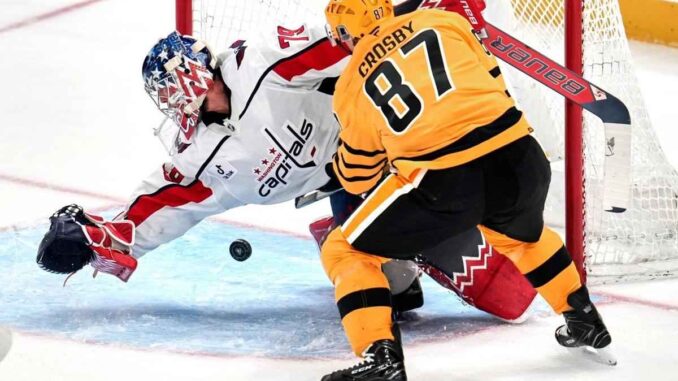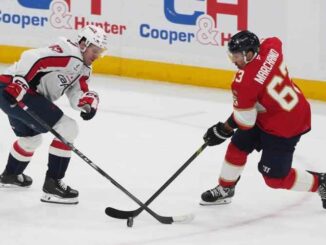
The Penguins looked poised to lose their second straight game after holding a 3-0 lead Thursday as they faced a Capitals power play about nine minutes into the third period.
Rookie Ben Kindel had drawn a delay of game penalty for batting the puck over the glass in his own end. About 30 seconds later, Alex Ovechkin had a clean look at a slapshot from close range. The nightmare in Toronto on Monday seemed to be playing out again.
But Arturs Silovs made the stop. Within seconds, the Capitals’ Dylan Strome was called for cross-checking on Parker Wotherspoon, and the Penguins were not only out of the jam — they had 45 seconds to unleash their greatest weapon of the young season: the power play.
Erik Karlsson grabbed control of the puck between the blue lines — making up for his own giveaway moments earlier. Kindel then fired it along the boards to Evgeni Malkin, who continued his scintillating start to the season with a brilliant pass across the ice to Bryan Rust. The veteran winger took care of the rest to give the Penguins a 4-3 lead and the fans in PPG Paints Arena a collective sigh of relief.
Sidney Crosby, red-hot power play lead Penguins to win over Alex Ovechkin’s Capitals
Kindel said he spotted Malkin by himself on the weakside and tried to get the puck over to the player who came into the game tied for second in the NHL with 16 assists. Malkin’s pass to Rust for his 17th helper of the year was “unreal,” said Kindel, who was also credited for an assist on the winner and had another power-play assist on Sidney Crosby’s opening goal.
The Penguins scored three power-play goals in five opportunities during Thursday’s 5-3 win against the Capitals after entering the game second in the league with a 32.4% scoring clip in those opportunities.
“We’re just going out there and playing hockey,” said Rust — who had a hand in all three power-play goals, with two assists in addition to his winner. “We’re trying not to overthink things. I think guys have an idea of what we’re trying to do, and we’ve got some good players out there that know how to find space and make some plays.”
The team carried a three-goal advantage into the third period in Toronto on Monday before allowing the Maple Leafs to draw even in less than three-and-a-half minutes. Toronto added the game-winner later in the third.
So after the Penguins built a 3-0 lead in about 22 minutes Thursday, the PPG Paints Arena crowd could be forgiven for getting antsy the moment the Capitals got one back on a Strome goal set up by Ovechkin about midway through the second period.
About five minutes later, the suddenly rejuvenated Capitals — who were on the second night of a back-to-back, while the Penguins were coming off two days of rest — added another goal. And another in the waning seconds of the second period.
“We were just in this situation three days ago,” Penguins coach Dan Muse said. “It would have been really easy for this group to cave.”
Joe Starkey: Crosby-Ovechkin has become the most enduring individual rivalry in American sports history
But unlike Monday north of the border, the Penguins had a period break to regroup. The first half of the third period was far from perfect, but they survived. Then Strome’s cross-check ended another successful penalty kill for the Penguins — one of three on the night — and opened the door for the Penguins’ best source of offense.
“That unit’s been unreal all year,” Kindel said. “No matter who’s on it, they just make it easy for whoever goes on there to make the reads.”
The 18-year-old phenom has become a key part of the power play. He rifled a pass to Crosby for a power-play goal less than two-and-a-half minutes into Thursday’s game for his first career NHL assist.
“I don’t know if the defenseman was expecting it,” he said.
Then with the game in danger of spiraling for the Penguins again, he made the wise — if easy — choice to get the puck to Malkin before Rust’s goal unleashed a roar equal parts excitement and relief from the 18,384-person crowd.
Crosby-Ovechkin doesn’t disappoint
A day after Ovechkin made history, Crosby provided a poignant reminder of how their rivalry has typically played out.
Ovechkin became the first player in NHL history with 900 goals in a win against the Blues on Wednesday. But a day later, Crosby poured in two power-play goals in the first 12 minutes of the game to build the Penguins’ lead.
It was the 99th meeting between the two all-time greats, including playoffs. Crosby and the Penguins now lead 56-39-4 in those meetings after Thursday’s win.
Ovechkin added two assists of his own to spark the Capitals’ comeback. Crosby now has 97 points to Ovechkin’s 70 in their 74 regular-season matchups.
Kindel described it as what he “grew up watching.”
“Kind of like the old Sid and Ovi rivalry there,” Kindel said. “So it was … unreal to watch.”
Kindel was, to use Post-Gazette columnist Joe Starkey’s words, minus-2 years old when Crosby and Ovechkin first played against each other. He skated on Crosby’s line for the first time Thursday and delivered several pretty passes to create scoring chances throughout the game — none more impressive than the strike across the ice to set up Crosby’s opening goal.
Muse praised the “crispness” of the 18-year-old’s play.
“It just seemed like every pass that he was making was quick, it was on the tape,” said the first-year coach who has led the Penguins to a 9-4-2 start and a tie with the Devils atop the Metropolitan Division standings.
The PPG Paints Arena crowd put aside their innate ire for Ovechkin to give the NHL’s all-time leading goal-scorer a standing ovation — with only a smattering of boos mixed in — to honor his latest milestone during the first period.
It appeared he would provide his own encore with the two second-period assists that seemed poised to deliver a comeback win. But the Penguins’ penalty kill and power play yet again saved the day.
“The special teams were outstanding, both sides of it,” Muse said.
The Penguins’ power play has now converted 14 of 39 chances (35.9%) this season. Their penalty kill came into the game ninth in the NHL and has now surrendered just 7 goals in 45 attempts (15.6%).
“Major, major factor there in the result,” Muse said.
First Published: November 7, 2025, 10:00 a.m.


Be the first to comment